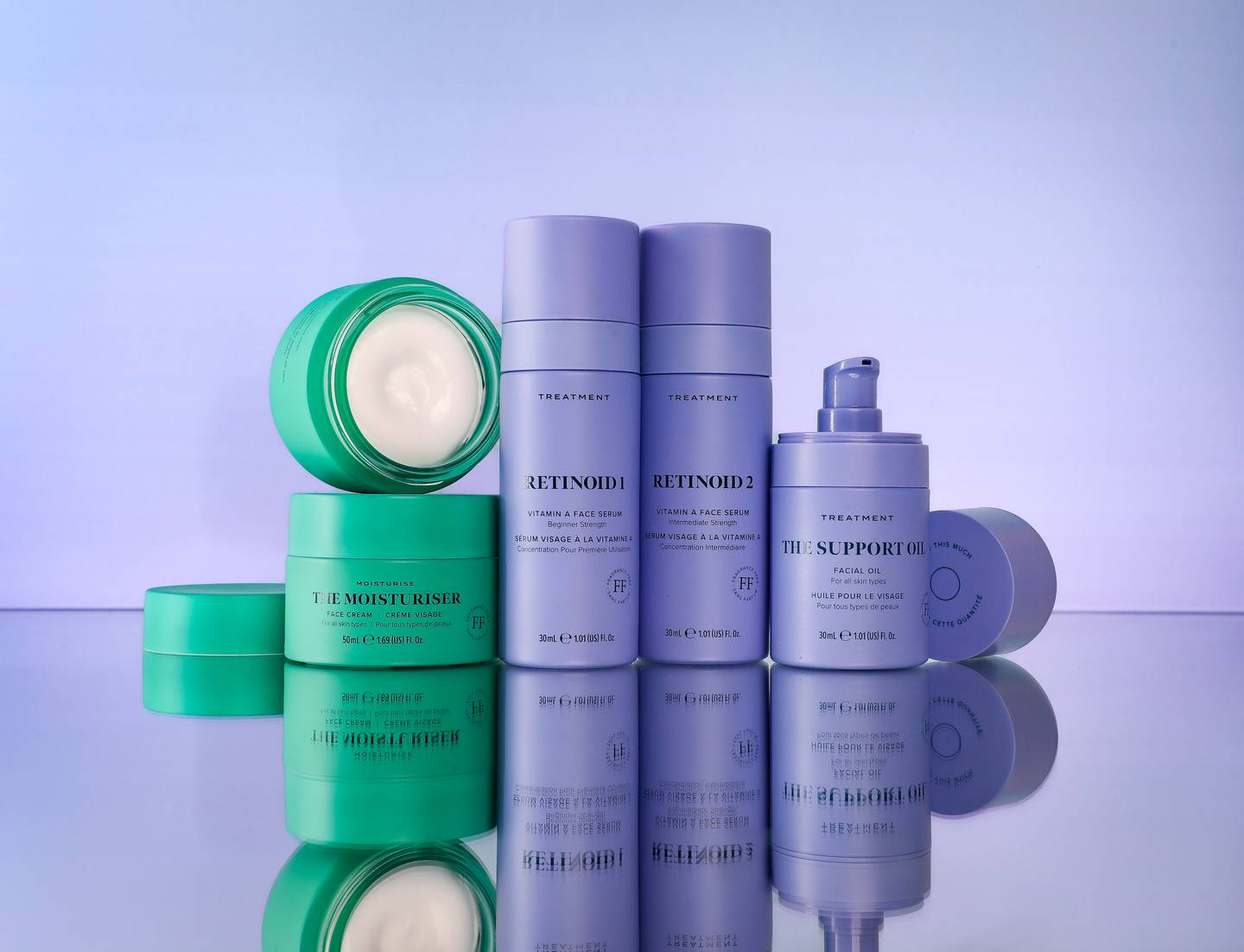
Gráinne Mellett is Caroline Hirons’ ideal customer.
The London-based tech executive says she’s no beauty junkie, but she does love skin care. She was taken with Hirons’ “no-nonsense” approach to beauty soon after moving from Ireland to the UK in 2018, where she encountered the creator on YouTube calling out influencers for recommending products while receiving payments from the same brands.
“She was the anti-influencer,” said Mellett. “Caroline has some of the clearest advice to the general public about skincare, without making us unpack so much information. It’s accessible.”
Fans like Mellett are part of a thriving community of Hirons devotees, who have swapped out their beauty bags based on Hirons’ advice, bought her books: “SkinCare: The Ultimate No-Nonsense Guide” and “Skincare: The New Edit” and purchased her monthly “Kits,” containing Hirons-approved products.
Now, the 53-year-old mother of four is banking on that same cohort to follow her one step further as Hirons becomes a skin care entrepreneur herself. In November 2022, Hirons debuted her line Skin Rocks, with two retinoid products on SkinRocks.com and at Space NK. On Mar. 7, the brand expands with three more items, two moisturisers, one fragrance-free, the other with fragrance and a support oil, with more products coming later this year.
The beauty industry is rife with celebrities, influencers, dermatologists, models and founders all proclaiming their word and brand are gospel. Hirons has built a reputation as a uniquely authoritative voice: she was one of the first prominent influencers to (publicly) say “clean” beauty is “absolute bullshit.” She routinely promotes affordable products and calls out other brand founders like Paula Begoun of Paula’s Choice and Naturium’s Susan Yara for their lack of transparency about everything from adding ingredients that they previously swore off to their failure to disclose working relationships with brands. She even criticised Gwyneth Paltrow for failing to put enough sunscreen on her face during a Vogue Beauty Secrets video.
When discussing Hirons with beauty insiders this month, one said “I respect her.” Another was more blunt: “She’s got the U.K. beauty market by the balls.”
Hirons is more modest, though equally colourful describing herself.
“I’m a qualified expert in my industry,” said Hirons, who does not identify as an influencer. Nor does she fit the template for one: at 53 she is more than double the age of many of her peers, doesn’t claim to be “posh” and is a grandmother. “I always knew the term influencer was going to go tits up because … people don’t trust a lot of influencers … But I can appreciate [that] I have influence.”
As Hirons transitions from aesthetician and content creator to beauty brand founder, she will be tasked with walking a fine line as both an unbiased expert and selling her own line – a path that has been difficult for those who have come before her.
Millie Kendall, CEO of The British Beauty Council, said that Hirons’ background has helped Skin Rocks see early success.
“British beauty influencers have all excelled in their field before launching lines,” she said. “Vidal Sassoon, Anita Roddick … Charlotte Tilbury were all experts before they built their lines. Caroline is doing the same thing. She hasn’t had a fast rise, this is 30 years in the making.”
The Road to Influence
Hirons got her start in beauty at the Aveda counter at Harvey Nichols, before moving into retail operation roles at Chantecaille and other companies. While recommending products and performing facials by day, Hirons trained as an aesthetician at Steiner School of Beauty Therapy in London by night.
“You don’t need the qualification[s] to do an-in store department store mini facial, but I still was thinking, ‘Yeah, if I want people to listen to me, I need to have a piece of paper … I need to give people a reason to listen to me,’” she said.
In 2009, Hirons began consulting for beauty companies, many of which were US brands trying to break into the UK market. A year later, she took her expertise to the masses. After experimenting with Twitter, Hirons started a blog, Beautymouth.com (which later became CarolineHirons.com), to conduct what she calls “skin care clinics,” answering questions like “Why are you excited about this really thick foundation, what are you trying to hide? What’s wrong with your skin [underneath]?,’ Hirons said.
Last year, her website saw one million visitors, Hirons has over 1.2 million followers across her social media channels. Through her various ventures, including the monthly Kits, Hirons brought in over £10 million, (roughly $12 million) in revenue in 2022, she said.
Getting Into Product
When Skin Rocks came to market last November, it followed Hirons’ app of the same name that launched in July 2022. Before it came to life, Hirons pursued other ventures like selling Kits to her community, beginning in 2019. She continues to do select paid partnerships and sees proceeds from her books.
Skin Rocks released just two products last November, because “that was what was ready,” said Hirons. The line is now the best-selling retinol brand at Space NK. Launching moisturisers and a face oil were obvious next steps.
“We’re going to have cleansers, acid treatments, serums … SPF … eye creams, things that I love,” said Hirons of her product pipeline into 2024. “But I’m not going to make different franchises, and turn out five different SKUs per franchise. It’ll be what it is.”
Hirons has yet to take investment. “I don’t like people telling me what to do,” she said. And she is in no hurry to expand the brand to the US (60 percent of her audience is in the UK and Ireland; the US, Australia and Canada make up the rest). Still, she is expected to bring in well over £15 million in revenue in 2023 ($18 million). Skin Rocks alone is expected to account for £10 million ($12 million).
But having legions of online fans is no guarantee that shoppers will buy her line.
Leah Ryan, a former beauty brand executive based in the UK, has been a Hirons convert since 2018. She credits her devotion to retinols from Medik8 and The Ordinary’s Squalene Cleanser to Hirons.
“I stalked that cleanser for months,” she said. “[Caroline] cuts through the fluff, telling you what would work for your skin type or if something is worth the price point.”
Ryan has yet to buy Skin Rocks, but is opening to trying the line if it expands out of retinol. Mellett is more sceptical.
“I skip past it a bit,” she said. “From a business perspective, I understand what she is doing and I don’t fault her for that, but I don’t find her content as engaging as it was six months ago.”
Creators known for their beauty advice and product reviews have had a mixed track record as brand founders. Hyram Yarbro, the pandemic’s ‘skininfluncer’ of choice, saw his line with The Inkey List dropped from Sephora. It relaunched with lower price points at Target last year. Makeup artist Jaclyn Hill revived Becca Cosmetics in 2015, but couldn’t recreate the same hype for her own line Jaclyn Cosmetics that was riddled with consumer complaints of defective products and mould in 2019.
Hirons believes her skin care and retail expertise is what differentiates her from other early day bloggers or influencers like Jackie Aina, Patrick Starrr and Emily Weiss who have gone on to launch lines.
“Makeup is very polarising. Skin care isn’t,” she said. “I would have always had a line, but having a blog just made it happen faster.”



